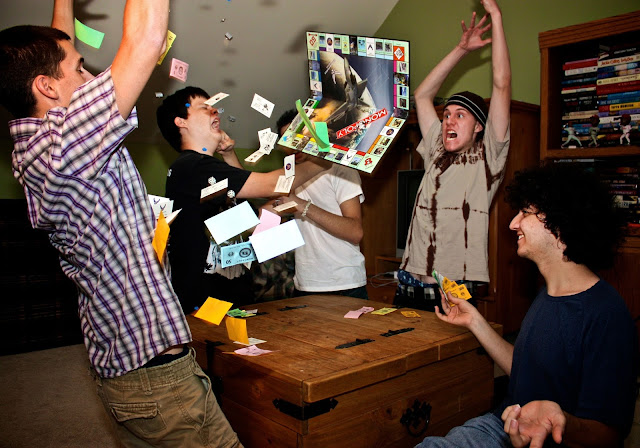One thing I've been fascinated with lately is the idea of board gaming as an evolving art form. Art forms take time to mature, to develop complex themes and ideas, but I think Board-Gaming is getting there.
Boardgames are a unique art form, because it is about creating an experience for players, about evoking certain thoughts, emotions and ideas. Whether that's in a purely intellectually sense in an abstract game like Chess or a purely social sense with games like the Resistance.
And i'm not talking about the literal artwork on a game, but the idea of a game as art itself.
Boardgames can be just a simple toy, but there is more to them than that. Just as Computer games and film explore settings, characters, stories and emotions, so do boardgames. And as an art form, its starting to present mature and interesting themes.
Boardgames are a lot like music, an art form that can be recreated by others and each time it's interpretation is influenced by its participants. Just as "I will survive" sounds different when played by Gloria Gaynor or Cake. Two different groups of players will have a different experience each time they play a game.
So what do we get from this art form?
Well, a kaleidoscope of experiences depending on what games you play.
Historic wargaming can be very intellectually stimulating, as the competition and competitive nature of the game tests your reasoning against other people. But its also a medium for traditional arts, such as painting and sculpting. Add to that the interest Wargamers show in researching the periods they play in to ensure historical accuracy, and you can see the impact the art has on them.
Fantasy/Sci Fi Wargaming is the same, asides from instead of researching the history, players tend to immerse themselves in works of fiction. And for a lot of people, army selection is a form of artistic expression. People play Space Wolves, for the most part, because they find space vikings cool.
Euro style games tend to focus on decision making, maximizing moves, efficiency and reacting to changes in the board state. These games test us in intellectual ways, and the emotions that come about are normally to do with how well we executed our plans.
Games with heavy social elements, like Spyfall, Battlestar Galactica and Coup test our social skills and expose our social dynamics. It's rare that we tell utter lies to our closest friends, but in these games, that is the norm. We get to experience deception and betrayal, misdirection and obfuscation and enjoy it. I can't think of any other time or place where you can do that with friends.
And co-operative games explore group social dynamics. How much does one person dominate, do you problem solve as a team, do you defer to others, or do you just "do your thing".
Even solo games provide an interesting experience in introspection that's quite unique.
 |
| Still counts for solo play |
These are broad strokes, and your millage may vary. But if you have played a boardgame, and have at least one story about "the time that....", then the games have impacted you as an experiential art form.
 |
| Every gamer has had a moment a bit like this. |
Does it matter?
I don't really know. Like a lot of art forms, you don't have to delve too deep to enjoy them. You can enjoy music without knowing what counterpoint is or what Phrygian mode sounds like. You can enjoy a movie without a degree in film studies (some might argue its easier to enjoy film then). And you can look at a painting and appreciate it without being able to hold a brush.
But for me, I think i'm more interested in looking at what a game delivers, what experience its going for, and how that impacts on a social group than I ever have been before.
And as a result, i've been looking at games with different themes, different ideas and different experiences a lot more than before. But more about that later.

